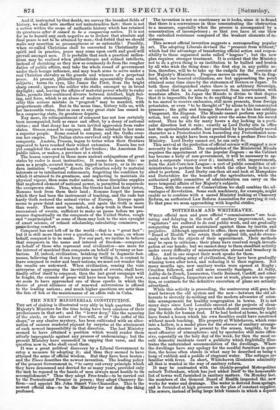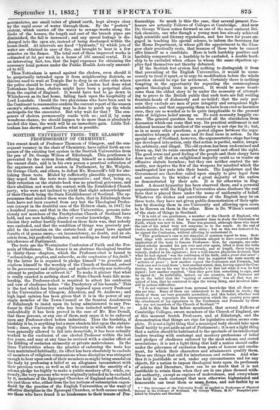TOTTENHAM AND WHITEHAVEN.
WHILE official men and pure official " commissioners" are hesi- tating and delaying in the work of sanitary improvement, mere "agitators" are suffered to do real public work, and are gradually conquering the ground maintained against them by inertia and prejudice. Although appointed to office, there are members of the "Board of Health" who retain their original life, and do strenu- ously work for the objects of their appointment. Their methods may be open to criticism; their plans have received rough investi- gation at our hands; but we cannot deny to them steadfast activity under every difficulty of misconstruction abroad and treachery in office. And in one respect their work speaks for them.
Like an invading army of civilization, they have been gradually winning town after town, and reducing it to their regimen. Not many months ago, new sanitary works were opened at Rugby ; Croydon followed, and still more recently Sandgate. At Selby, Ashby-de-la-Zouch, Launceston, Castle Bernard, Cardiff, and other towns and villages, Inspectors are now at work, plans are in opera- tion, or contracts for the definitive execution of plans are actually advertised.
While this activity is proceeding, the controversy still goes for- ward between the old system and the new—between the old ad- herents to slovenly do-nothing and the modern advocates of scien- tific arrangements for healthy congregation. in towns. It is not many days since Lord Lonsdale sneered at the projects of clean- sing human abodes by a process which should concurrently ferti- lize the fields for human food. If he had looked at home, he might have found a lesson which his own faculties could have construed without much teaching. His property at Whitehaven, which runs into a hollow, is a model place for the absence of sanitary arrange- ments. Their absence is present to the senses, tangibly, by the most offensive of atmospheres ; and by spectacles still more offen- sive, especially on the holy day of the week, for then the most oc- cult domestic incidents court a publicity which frightfully illus- trates the unfurnished accommodation of the dwellings. Where the dwellings have any apology for the needful furniture in ques- tion, the house often stands in what may be described as being a heap of rubbish and a puddle of stagnant water. The cottages are familiar with fever. In short, Whitehaven illustrates admirably all that is wanted in the way of sanitary reform. It may be contrasted with the thickly-peopled Metropolitan suburb Tottenham, which has just added itself to the honourable list of towns well furnished in sanitary matters. On Monday last, the members of the General Board of Health inspected the new works for water and drainage. The water is derived from springs, and is furnished at high pressure on the plan of constant supplies. The sewers, instead of being large brick tunnels in which a deposit
accumulates, are small tubes of glazed earth, kept always clear by the rapid scour of water through them. By the " postern " system, which carries of the water to sewage-works along the backs of the houses, the length and cost of the branch pipes are diminished, the fall is increased ; and any casual leakage is dis- charged into the open air, instead of being discharged within the house itself. At intervals are fixed "hydrants," by whioh jets of water are obtained in case of fire, and brought to bear in a few minutes on the flames. The total cost of these improved works is estimated at 3d. per week in a house of 101. annual rental. It is an interesting fact, too, that the legal expenses for obtaining the necessary local powers under the Public Health Acts only amount- ed to 67/.
Thus Tottenham is armed against the cholera, even should it be perpetually intruded upon it from neighbouring districts, as thieves used to wait at Temple Bar to drop in on either side where the police should be less vigilant. If all London had done what Tottenham has done, cholera might have been a perpetual alien from the capital of England. It would have had to go down- to Whitehaven as its last home, falling back upon the hospitality of Lord Lonsdale. thould the two physicians who have been sent to the Continent to reconnoitre confirm the current report of the unseen enemy's advance, something may be done to patch up the whole metropolis for the encounter. But why wait for that ? The con- geners of cholera permanently reside with us ; and if, by some wondrous chance, we should happen to do more than is absolutely needed this time, the work will be an immediate gain. Little Tot- tenham has shown great London what is possible.



























 Previous page
Previous page